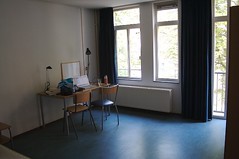Making unexpected progress on my research
For my friends, family, or anyone else reading this blog, I just wanted to throw out a warning that there are going to be a lot of posts (like this one) that are about my research rather than fun and exciting tales of my travels in Amsterdam. If you still want to read these posts, that is great and I hope you enjoy them, but I won't be crushed if you don't find them interesting and choose to skip over them :)
My roommate that is moving out tomorrow asked me if I wanted to come down and hang out with him and some friends down in the courtyard for a little while tonight. I wasn't really doing anything too important, so I went down to meet my roommate's friends. We got to talking about the research that I am doing while I'm in Amsterdam, and one guy in particular had some really great insight that gave me a few ideas.
First of all, he is from London, and has been living in Amsterdam for the past three years, so he has had a chance to get a feel for Dutch culture from an outside perspective. He is also pursuing his master's degree in Economics, so he is well educated. I was basically presenting my research by explaining how I am looking at the relationship between Amsterdam's urban planning and Dutch culture. Specifically the fact that the city from an urban planning perspective isn't modern, and in fact quite old. At the same time Dutch culture is very modern and progressive in many ways.
He brought up the point that Amsterdam's urban planning is in fact extremely modern. The primary reason being that cars are strongly discouraged from entering the city center. This is accomplished in a variety of ways: the roads are extremely narrow, the roads are very bumpy, bikes and trams have dedicated paths that have priority over cars, if you do manage to get your car into the city center parking is nearly impossible to find, if you do find parking it is extremely expensive, and there are thousands of people walking on sidewalks that usually can't even fit three people across which pretty much guarantees people are walking in the streets. Basically after a person tries driving in Amsterdam one time, they will realize that it is not worth the effort.
To see why not having cars is modern, consider a city that encourages cars into its center. It is the thinking of many urban planners that you want to bring in as many cars to the city as possible because bringing in cars will bring in people that spend money, and this is needed for a city to thrive economically. As anyone who has lived in a big city knows, lots of cars means lots of traffic. This means it takes an extremely long time to drive short distances. Furthermore all of the cars make for a considerable amount of pollution that leads to lower air quality. Now, Amsterdam which is for the most part car less, it is actually very efficient to get around the city using public transportaion such as the metro/tram/bus system. If you need the autonomy of personal transportation, you will be quick to find that nearly all Amsterdammers own bikes, which are also very efficient. What you end up with are no traffic jams and very clean air, while at the same time allowing for quck transportation.
This idea of a pedestrian only city is very modern and not widely accepted in many other cities. The interesting thing is that to implement this modern way of thinking, the Dutch utilize the aspects of the city that are very old. This interesting contrast is something that I would like to explore more as I delve deeper into my research.


